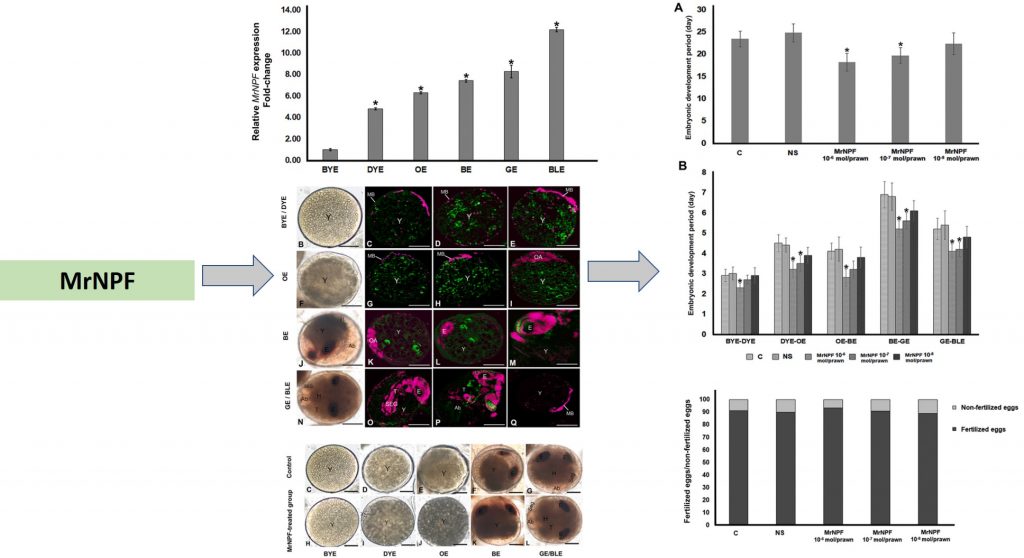
การศึกษาการแสดงออกและการออกฤทธิ์ ของ neuropeptide F ต่อการเจริญของตัวอ่อนในกุ้งก้ามกราม Macrobrachium rosenbergii
Highlight:
คณะผู้วิจัยได้พบองค์ความรู้พื้นฐานใหม่ที่สำคัญคือ MrNPF expression levels เพิ่มจากตัวอ่อนระยะแรก ไปยังตัวอ่อนระยะสุดท้าย early to late embryonic stages MrNPF peptide กระตุ้นการพัฒนาของตัวอ่อนให้เร็ว เพิ่มเปอร์เซ็นต์ของ fertilized eggs เพิ่มจำนวน proliferative cells และยังพบว่า MrNPF-treated embryos ยังคงแสดงลักษณะปกติเมื่อเทียบกับกลุ่มควบคุม ซึ่งผลการวิจัยที่ได้นี้ให้องค์ความรู้พื้นฐานที่สำคัญเกี่ยวกับบทบาทใหม่ของ MrNPF ในการพัฒนาตัวอ่อนของกุ้งก้ามกราม และอาจจะนำไปประยุกต์ใช้ในการช่วยเพิ่มการผลิต offspring สำหรับสัตว์ครัสเตเชียนเศรษฐกิจชนิดนี้ได้ในอนาคต
ที่มาและความสำคัญ
In some aquaculture practices, female broodstocks have their eyestalk ablated to stimulate ovarian maturation and spawning. However, this technique causes endocrine disruptions, which eventually lead to permanent damage and death of adult females, and subsequently have negative impacts on offspring quantity and quality, including ethical problems regarding animal rights and usage (Benzie 1998; New, 2002; Nagaraju, 2011). To meet the market demands of commercial production of this crustacean species, it is of great importance to gain knowledge on factors that control and promote embryonic development and their possible actions, which could be applied in solving prawn aquaculture problems by increasing the mass production of high-quality offspring of economic crustacean species by aquaculture. To our current knowledge, there is still a lack of important information on the presence of MrNPF in the embryonic stages of M. rosenbergii and its important role during the embryogenesis of this crustacean species. Understanding how MrNPF regulates embryonic development may help enhance the production of embryos and larvae of this M. rosenbergii, and this neuropeptide could be useful to promote the high quantity and quality of offspring in this important crustacean species by aquaculture.
Abstract
In the present study, we examined differential expression of Macrobrachium rosenbergii neuropeptide F (MrNPF) transcripts, and studied the presence of MrNPF during embryonic stages. We further investigated the effect for MrNPF on embryonic development of M. rosenbergii. By using RT-qPCR, the MrNPF mRNA levels showed a gradual increase from the early embryonic stages to the late embryonic stages. This coincides with initial expression of MrNPF immunoreactivity (MrNPF-ir) in the early embryonic stages and later strong MrNPF-ir in the late embryonic stages. Treating with MrNPF at doses of 10−6 and 10−7 mol/prawn into the female prawns significantly shortened the lengths of embryonic periods, exhibited faster attainment of each embryonic stage, and increased the number of proliferative cells, compared with the control groups (P < 0.05). In addition, the percent of fertilization was higher in the MrNPF-treated group at a dose of 10−6 mol/prawn, compared with the control groups (P < 0.05). The mean egg size of MrNPF-treated groups at doses of 10−6 and 10−7 mol/prawn also was slightly larger than that of the control groups. Following treatment with three doses of MrNPF, developing embryos also showed normal development in terms of eye pigmentation and differentiation, appearance of a beating heart, appearance of oily yolk, formation of the abdomen, and folding of the telson. Taken together, our results provide new insight into the potential role of MrNPF in the embryonic development of M. rosenbergii
Keywords: Neuropeptide F, Embryonic development, Embryos,
Freshwater prawn, Macrobrachium rosenbergii, Aquaculture
Citation:
Tinikul Y, Tinikul R, Poljaroen P, Sobhon P. (2022) Differential expression of neuropeptide F during embryogenesis, and its promoting effect on embryonic development of freshwater prawn, Macrobrachium rosenbergii. Aquaculture. 555C, 738260.
https://doi.org/10.1016/j.aquaculture.2022.738260
RELATED SDGs:
14. LIFE BELOW WATER

ผู้ให้ข้อมูล: รองศาสตราจารย์ ดร.ยสวันต์ ตินิกุล
ชื่ออาจารย์ที่ทำวิจัย: รองศาสตราจารย์ ดร.ยสวันต์ ตินิกุล
แหล่งทุนวิจัย: Thailand Research Fund (TRF), Thailand Science Research and Innovation, Mahidol University (TRF Mid-Career Research Grant), Mahidol University (Fundamental Fund: Basic Research Fund, fiscal year 2022), The NSRF via the Program Management Unit for Human Resources & Institutional Development, Research and Innovation, and Faculty of Science, Mahidol University
Tags: Aquaculture, Embryonic development, Embryos, Freshwater prawn, Macrobrachium rosenbergii, Neuropeptide F
